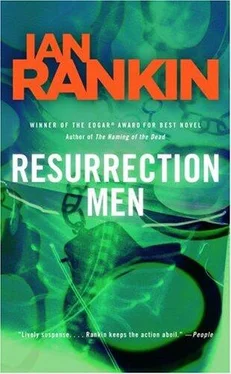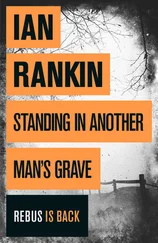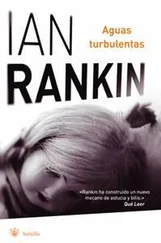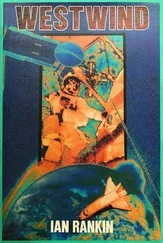But Claverhouse wasn’t falling for it. “I was talking to DCS Templer this evening. She was very interested to find out about Donny Dow’s chauffeuring duties.” He paused. “But you knew all the time, didn’t you?”
“Did I?”
“You didn’t manage to sound very surprised when I told you. Thinking back, you didn’t sound surprised at all . . . so how come she didn’t know? Keeping stuff to yourself again, John . . . maybe you just wanted to protect your pal the Weasel.”
“He’s not my pal.”
“His lawyer came asking all the right questions, almost as if he’d been primed.” It was Claverhouse who had advanced on Rebus this time, not that Rebus was budging an inch. He could hear the bath still filling. Not long now and it would start to overflow. “What was he doing here, John?”
“You wanted me to talk to him . . .”
Claverhouse paused. A glimmer of hope seemed to rise in his eyes. “And?”
“Nice talking to you, Claverhouse,” Rebus said. “Say hello to Ormie for me when you catch up with him.” He stepped backwards into his hall, and started closing the door. Claverhouse stood unmoving, almost as if he planned to stay there till morning. Not saying anything, because nothing needed to be said between them. Rebus padded back to the bathroom and turned off the tap. The water was scalding, and there wasn’t enough room to add cold. He sat down on the toilet and held his head in his hands. It struck him that he actually trusted the Weasel more than he did Claverhouse.
Make sure you know whose side you’re on . . .
Rebus didn’t like to think about it. He still couldn’t be sure that he hadn’t landed in a trap. Was Strathern out to nail him, using Gray and the others as bait? Even if there was some dirty deal to uncover, something involving Gray, Jazz and Ward, could Rebus succeed without implicating himself? He got up and went through to the living room, found the whiskey bottle and a glass. Picked up the first CD he found and stuck it on. REM: Out of Time. The title had never meant more to him than right here, this minute. He stared at the contents of the bottle but knew he wasn’t going to touch it, not tonight. He swapped it for the phone, called Jean at home. Answering machine, so he left another message. He thought about driving to the New Town, maybe dropping in on Siobhan. But it wasn’t fair to her . . . and she was probably out driving anyway, her scalp burning, eyes not quite focused on the road ahead . . .
He walked softly back to the door and put his eye to the peephole. The landing was empty. He allowed himself a smile, remembering the way he’d left Claverhouse dangling. Back into the living room and over to the window. No sign of anyone outside. On the hi-fi, Michael Stipe alternated between rage and grieving.
John Rebus sat down in his chair, prepared to let the nighttime take its toll. And then the phone rang, and it had to be Jean returning his call.
But it wasn’t.
“All right, big man?” Francis Gray said, in that soft west coast growl of his.
“Been better, Francis.”
“Never fear, Uncle Francis has the cure for all ills.”
Rebus rested his head against the back of his chair. “Where are you?”
“The delightful surroundings of the Tulliallan officers’ bar.”
“And that’s the cure for my ills?”
“Could I be that heartless? No, big man, I’m talking about the trip of a lifetime. Two people with a whole world of possibilities and delights opening before them.”
“Someone been spiking your drinks, DI Gray?”
“I’m talking about Glasgow, John. And you’ll have me as your guide to what’s best in the west.”
“It’s a bit late for all this, isn’t it?”
“Tomorrow morning . . . just you and me. So be here at sparrow-fart or you’ll miss all the fun!”
The phone went dead. Rebus stared at it, considered calling back . . . Gray and him in Glasgow: meaning what? Meaning Jazz had spoken to Gray, told him Rebus had something to offer? Why Glasgow? Why just the two of them? Was Jazz distancing himself from his old friend? Rebus’s thoughts turned again to the Weasel and Cafferty. Old ties could loosen. Old alliances and allegiances could crumble. There were always points of vulnerability; cracks in the carefully constructed wall. Rebus had been thinking of Allan Ward as the weakest link. . . now he was turning to Jazz McCullough. He went back through to the bathroom, gritted his teeth and plunged his hand into the superheated bathwater, letting the plug out. Then he turned on the cold tap to restore some balance. Back through to the kitchen for a mug of coffee and a couple of vitamin C tablets. Then into the living room. He’d hidden Strathern’s report under one of the sofa cushions.
His bathtime reading . . .
Bernie Johns had been a brute of a man, controlling a large chunk of the Scottish drug trade by means of contacts and ruthlessness, disposing of any and all contenders for his crown along the way. People had turned up tortured, maimed or dead — sometimes all three. A lot of people had simply disappeared. There had been talk that such a lengthy and successful reign of terror could be achieved only with the help of the police. In other words, Bernie Johns had been a protected species. This had never been proven, though the “report,” such as it was, made mention of some possible suspects, all based in and around Glasgow, but none of them Francis Gray.
Johns had lived for a large part of his life in an unassuming public housing unit in one of the city’s toughest projects. He’d been “a man of the people,” gifting money to local charities and benefiting everything from toddlers’ playgrounds to old people’s shelters. But the giver was also a tyrant, his munificence tempered by the knowledge that he was paying for power and invulnerability. Anyone came within a hundred yards of him on his home turf, he got to know about it. Police surveillance activities were scuppered within ten minutes of their outset. White vans were rumbled: flats were located and attacked. Nobody was going to get near Bernie Johns. There were plenty of pictures of him in the folder. He was tall, broad at the shoulders, but not physically massive. He wore fashionable suits, his wavy blond hair always carefully groomed. Rebus could imagine him as a child, playing the Angel Gabriel in his school’s Christmas show. The eyes had hardened in the interim, as had the jaw, but Johns had been a handsome man, his face sporting none of the nicks and slashes associated with longevity in a gangster.
And then Operation Clean-Cut had come along, involving several forces in a long-term surveillance and intelligence operation which had ended with a haul of several thousand tabs of Ecstasy and amphetamines, four kilos of heroin, and about the same weight of cannabis. The operation had been branded a success, and Bernie Johns had been put on trial. It wasn’t the first time he’d appeared in a dock. Three previous charges, all dropped due to admin cock-ups or by dint of witnesses changing their minds.
The case against him wasn’t watertight this time either — the Procurator Fiscal’s office had admitted as much in a letter Rebus found in the folder. It could go either way, but they would give it their best shot. Any police officer even rumored to have had links to Johns and his gang was sidelined throughout the investigation and trial. The team kept working even through the duration of the trial, ensuring evidence wasn’t changed or witnesses lost. It was only after Johns’s conviction that he started complaining that he’d been shaken down and ripped off. He wasn’t naming any names, but the story seemed to be that he’d been told that certain pieces of evidence could be “contaminated.” There was a price to pay, of course, and he’d been willing to pay it. One of his men had been dispatched to fetch the money from a secret stash. (Police had found little at Johns’s actual home: around five thousand in cash and a couple of unlicensed pistols.) The underling didn’t come back, and when he was tracked down, he told a story that he had been followed to the site and attacked by three men — almost certainly the same people who had done the deal in the first place. They had then cleaned Johns out. Precisely how much was involved was left to the rumor mill. The best estimate of Johns’s accumulated wealth was around the three million mark.
Читать дальше












